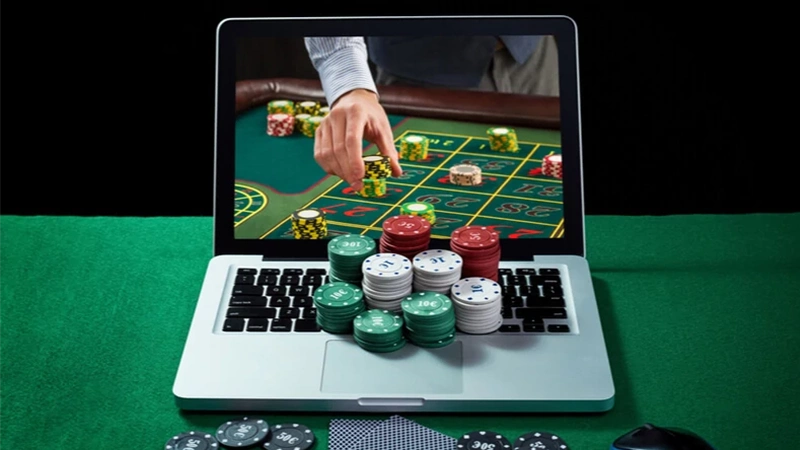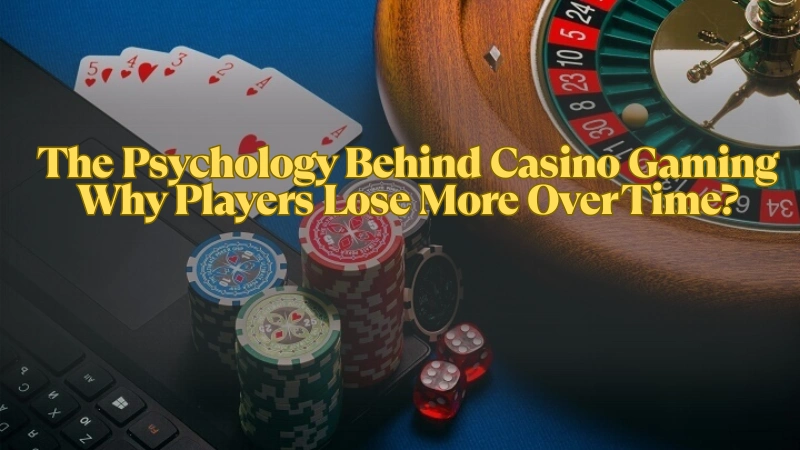Many players notice a troubling pattern: the longer they play, the more they tend to lose. While most attribute this to bad luck or probability, the real culprit often lies deeper in human psychology. Casino games are designed not just with mathematical advantages, but with psychological mechanisms that exploit our cognitive biases and emotional responses.
This article examines the common psychological effects that cause players to gradually lose control and face mounting losses over extended gaming sessions. Understanding these mental traps is the first step toward more responsible and strategic play.
The House Always Has the Edge – And Time Works in Their Favor
RTP and House Edge – Advantages That Compound Over Time
Return to Player (RTP) and House Edge are fundamental concepts in casino gaming. Even games with high RTPs of 96-98% still give the house a 2-4% mathematical advantage on every bet. While this might seem small, it becomes significant over time through the law of large numbers.
The longer you play, the more this statistical advantage compounds. Slot Game Algorithms are specifically programmed to ensure this edge remains consistent across thousands of spins, making extended sessions increasingly favorable to the house rather than the player.

The “Chase” Mentality Extends Gaming Sessions
When players experience losing streaks, a powerful psychological urge kicks in: the need to “get even.” This chase mentality drives players to extend their sessions far beyond their original intentions, often with increased bet sizes and reduced strategic thinking.
This behavior plays directly into the casino’s hands, as longer sessions inevitably favor the house edge. The emotional desire to recover losses overrides logical decision-making, leading to deeper losses and extended play periods.
Psychological Effects That Make You “Unable to Stop”
The Near Miss Effect
One of the most powerful psychological hooks in casino gaming is the near miss – when you almost win but fall just short. Research shows that near misses activate the brain’s reward system almost as strongly as actual wins, creating a false sense of being “close to victory.”
This effect is particularly pronounced in slot machines, where symbols line up tantalizingly close to winning combinations. Your brain interprets these near misses as progress rather than losses, maintaining motivation to continue playing when logic would suggest stopping.
The Sunk Cost Fallacy
The more time and money you invest in a gaming session, the harder it becomes to walk away empty-handed. This psychological trap, known as the sunk cost fallacy, makes players feel that stopping would waste their previous “investment.”

Players often think, “I’ve already spent so much, I can’t quit now,” leading to increasingly desperate attempts to justify past losses through continued play. This mindset transforms what should be entertainment into a psychological prison where each loss makes leaving more difficult.
Misconceptions About Probability
The Gambler’s Fallacy
Perhaps the most dangerous misconception in casino gaming is the belief that past results influence future outcomes. Players often think, “I’ve lost so many times, I’m due for a win,” which is completely false in games of chance.
Each spin, hand, or roll is independent of previous results. Random Number Generators (RNGs) have no memory of past events and no obligation to “balance out” previous losses with future wins. This misconception leads players to increase bets and extend sessions based on flawed logic.
The “Machine is About to Pay” Mentality
Many players develop superstitious beliefs about gaming machines being “hot” or “cold,” or owing them a big win after a series of losses. This thinking stems from our brain’s pattern-seeking nature, which looks for meaning in random events.
These false beliefs lead to dangerous decision-making: increasing bet sizes, switching between games frantically, or stubbornly staying on a “cold” machine expecting it to turn around. All of these behaviors increase overall losses and extend potentially harmful gaming sessions.
Fatigue, Loss of Control, and Accumulating Mistakes
Emotional Control Deteriorates During Extended Sessions
Mental fatigue is a serious factor in extended gaming sessions. As concentration wanes and stress increases, players make increasingly poor decisions. Emotional responses replace strategic thinking, leading to impulsive betting and abandonment of any systematic approach.
Tired players are more likely to chase losses aggressively, ignore their predetermined limits, and make bet sizes that are disproportionate to their bankroll. These emotional decisions compound quickly, turning manageable losses into significant financial damage.
Lack of Clear Time and Money Boundaries
Without predetermined limits on time and money, players often experience “session creep” – gradually extending their play beyond safe boundaries. What starts as a quick entertainment session can spiral into hours of compulsive play.

Small mistakes and poor decisions accumulate over extended periods. A series of slightly oversized bets, emotional chases, and ignored warning signs can transform a fun evening into a significant financial loss. The absence of clear stopping points removes the natural breaks that allow for rational evaluation.
Conclusion: How to Play Smarter at Casino 91 Club
Understanding these psychological traps is crucial for anyone who enjoys casino gaming. The longer you play, the more these mental biases work against you, regardless of your skill level or the games you choose. Winning consistently isn’t just about luck – it requires discipline and psychological awareness.
The most successful players recognize that casino gaming should be entertainment with predetermined limits, not a method for making money or recovering losses. They set strict boundaries for time and money before they start playing and stick to these limits regardless of short-term results.
Casino 91 Club encourages responsible gaming through built-in tools for setting time limits, spending caps, and transparent RTP information on all games. Our platform provides the resources you need to maintain control over your gaming experience.
👉 “Play for fun – and know when to stop.”

